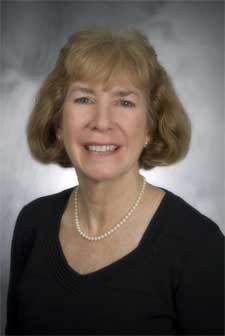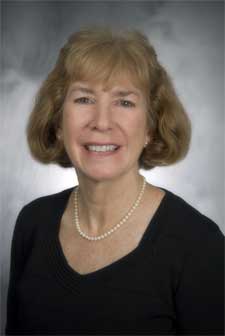 KINGSTON –January 13 2010 –Mary Sullivan, professor and director of graduate studies in the University of Rhode Island College of Nursing, was among 116 nurse-leaders inducted as Fellows of the American Academy of Nursing late last fall in Washington, DC.
KINGSTON –January 13 2010 –Mary Sullivan, professor and director of graduate studies in the University of Rhode Island College of Nursing, was among 116 nurse-leaders inducted as Fellows of the American Academy of Nursing late last fall in Washington, DC.
“Selection for membership is one of the most prestigious honors in the field of nursing,” said Academy President Catherine L. Gillis. “Academy Fellows are truly experts, representing the nation’s top nurse researchers, policymakers, scholars, executives and practitioners.”
Sullivan is only the fourth Rhode Islander to be selected as a Fellow of the American Academy of Nursing, and the only one at URI. “This is truly a big honor,” said Nursing Dean Dayle Joseph.
Sullivan is also a research scientist at the Brown Center for the Study of Children at Risk at Women & Infants Hospital, and an adjunct professor of pediatrics at the Alpert Medical School of Brown University. Selection criteria for the fellowship include evidence of significant contributions to nursing and health care and the extent to which an individual’s work influences health policies and health care delivery to the benefit of all Americans.
She leads a research team that is following the development of 213 infants born prematurely at Women & Infants Hospital in Providence between 1985 and 1989. The study is the only one of its kind in the United States. In 2008, Sullivan of West Kingston, R.I., received a $2.4 million grant to continue the long-term study tracking the health and well being of premature infants from birth through young adulthood.
“There’s a lot of good news relating to how very small babies do,” Sullivan said. “But the belief that, after a short period of time, the premature baby catches up to those born full term is not what we have found. They require continued monitoring.”
The babies – now adults – reflect demographics in Rhode Island at the time the study began, Sullivan said. “The population was not as diverse as it is now. The sample is primarily white, but represents all different socio-economic backgrounds.”
The mothers were screened and those selected for the study did not include individuals with alcohol or drug dependencies, or with a history of psychological difficulties.
Over the years, the retention rate of participants has been very high, she said – fully 96 percent of those who reached the age of four and over. “For the most part, they feel it’s important to help with a professional understanding of how premature infants grow over time,” Sullivan said. “They’re participating for altruistic reasons. They know their parents were helping us, so there’s kind of that bond.
“We’re in the middle of our most recent grant, starting year number three of a five-year study,” she said. If results merit, the researchers will apply for further funding.”
The study is among several long-term research projects in which Sullivan is involved. A smaller pilot study focuses on the evaluation of brain development and neonatal neuro-behavior in premature infants. In addition, with colleagues at the Brown Center for the Study of Children at Risk, Sullivan is doing research on how single-family rooms in the Neonatal Infant Care Unit affect newborns compared to the former “open bay” model.
Sullivan, who earned her bachelor of science in nursing from Salve Regina College and a master of science in nursing from the University of Nebraska, joined the research team in 1989 while studying for her doctorate at URI. She became its leader when URI Professor Margaret McGrath retired in 2006.
Along with her roles as research scientist, nurse, professor and administrator, Sullivan is also a mentor. “Mary has taken students – undergraduates as well as graduates – into her lab to work with her, mentoring several to follow in her footsteps,” said Joseph.
It is an experience Sullivan thoroughly enjoys “Part of my academic role is mentoring students,” she said. “It’s a lot of fun having them with us on our studies; we have a great team that welcomes them.
“We had three undergraduate students join us last summer,” she continued. “One of our graduate students will become a clinical nurse specialist in psychiatric mental health, and one will become a family nurse practitioner. And we just graduated a Ph.D. student who is a faculty member at Rhode Island College.”
Prior to her induction as a Fellow in the American Academy of Nursing, Sullivan participated in two days of orientation in Washington. Her husband and two of their children accompanied her to the event, which included a gala black-tie dinner.
“The next morning, my daughter and I ran a 10-k race along the Potomac River. That’s her idea of celebrating,” Sullivan laughed. “My husband walked the distance.”
She is excited by the opportunities that will arise as a result of her membership in the academy. “It’s great for URI, and it’s wonderful for the state in terms of furthering the contributions I can make to help advance best practices in health care for the nation. Nurses represent the largest segment of the U.S. health care workforce – there are more than 3 million of us. I’m eager to contribute in any way that I can to the various initiatives of the Academy of Nursing.”

